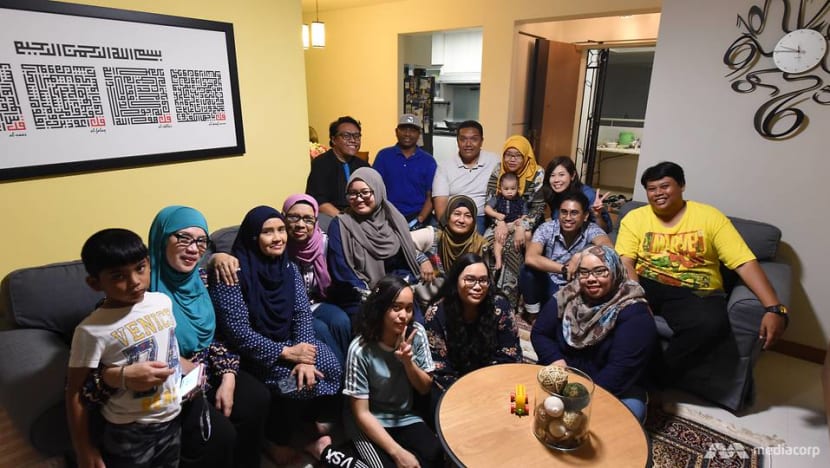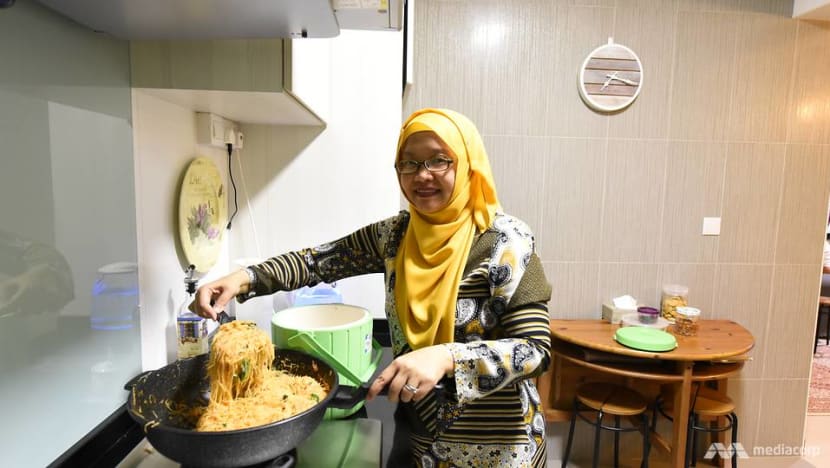The estate in Punggol that is keeping the kampung spirit alive

These residents in Punggol's Waterway Cascadia are bringing back the kampung spirit. (Photo: Marcus Mark Ramos)
SINGAPORE: Kampungs may have all but disappeared in Singapore, but a group of neighbours in Punggol is working hard to keep alive the community spirit of yesteryear.
They show up with food to accompany someone who might be eating alone, provide simple handyman services and buy groceries for one another. And they keep in constant contact through chat groups - just like family.
That sense of an extended family among neighbours was in evidence at a recent gathering of 20 people at one of the group's flats in Waterway Cascadia HDB estate, with conversation flowing easily and a sense of camaraderie in the air. The setting was modern, but they seemed to perfectly capture the kampung spirit - a colloquial term for neighbourliness and community, harking back to the 1950s and 60s when many Singaporeans lived in such areas and knew each other well.
The gathering was held at the home of Ms Juliana Johari, who lives at her Punggol flat with her husband and two teenage children. Speaking to CNA, she said that people in the group look out for one another in all sorts of ways.
"It could be as simple as 'I ran out of cooking oil but I have guests coming and I need to cook so can somebody spare me a cup'," Ms Juliana said.
Getting to the nearest shop would require a 20-minute journey as the new neighbourhood has yet to develop nearby amenities, she added.
In fact, her neighbour, Mr Mohammad Zaki, took it one step further. Once, he decided to cook instant noodles with egg, but discovered he had run out of eggs.
He messaged his neighbour who lives downstairs for help, and the men devised a neat system - the eggs were placed in a plastic bag and tied to a rope. One end was thrown up to Mr Zaki, and he used it to pull up the bag of eggs.
Commentary: Kampung spirit not a wish to revert to the past, but a longing for togetherness
Mr Zaki's wife, Ms Nurul Huda, has been on the receiving end of more than ingredients. She sometimes finds packets of food hanging on her gate.
"Sometimes they will text and ask if anybody is home because they have extra food. Sometimes I will be paiseh (embarrassed), so I will say it's okay, but they will still hang a packet on my door," she said.
In fact, food seems to be the glue holding the tight-knit group together. The potluck gathering meant that tables set up outside Ms Juliana's home were filled with food - from roti kirai to brownies to gado gado.
And it seems that they do not stand for their neighbours being lonely at the dinner table.
Ms Juliana recounted how once, when they knew she was alone at dinnertime with the rest of her family overseas, some of the group showed up unannounced with food so that she had some company.
"This kind of thing makes me feel like there’s family here, instead of having to travel from Punggol to Bedok (where her parents live) to get company," she said.
FROM BABYSITTER TO DELIVERY DRIVER
The Punggol group helps each other in small ways like family all the time.
For instance, when Ms Juliana has not been able to make it back home on time to receive groceries being delivered, all she has had to do was call her neighbour, who lives opposite her, to receive them instead.
What helps also is that she is so close to her neighbour that she knows when she will be home.
Sometimes, the neighbours themselves turn deliverymen, helping to buy groceries or bread from the bakery for their network of friends.
Mr Mas Siswandi Suyoto, another member of the informal group, finds his neighbours helpful when he is hosting many guests and needs items like foldable tables. At other times, he has also borrowed tools like a screwdriver and hammer.
It is also not difficult to get help in fixing minor electrical or carpentry issues, he said.
The neighbours also dote on his two-year-old son, something Mr Mas said he is grateful for. The toddler was the star of the recent gathering, as the adults cooed over him and tried to get his attention
Mr Mas' trust in his neighbours is implicit.
"I will have no problem entrusting my son to any of them to babysit if there is ever a need," he said.
His wife, Ms Elise Phong, also said she appreciated the presence of her neighbours at her son's milestone events.
"It does feel like we have family nearby as they are all welcoming and I feel like I can depend on them the way I would depend on my own family," she said.
But they are not fair-weather friends.
"If somebody is sick or in the hospital, then we will gather and visit. Or if there’s a death in the family, we will gather funds and visit the family to pass the funds,” Ms Juliana said.
CHALLENGES TO CREATING KAMPUNG SPIRIT
Associate Professor Tan Ern Ser from the Department of Sociology at the National University of Singapore said there are clear benefits to having a community spirit among neighbours, such as creating a more friendly environment, facilitating mediation and conflict resolution, and having people on hand who are keen to reach out to offer help and support when needed.
"Getting to know neighbours promotes ethnic and religious harmony, and contributes to community building and spirit," he said.
However, there are challenges that could get in the way of building such communities in a modern, urban environment, Prof Tan said.
For instance, people spend more time on digital devices rather than interact face-to-face, are generally able to be self-sufficient, and spend more time at home rather than out and about in the neighbourhood, he suggested.
HOW IT ALL STARTED IN PUNGGOL
However, such challenges did not stop the neighbours in Punggol. In fact, going by Ms Juliana's account, going digital paved the way for such bonds to be made.
She said that it could now be even easier to rouse the kampung spirit in HDB estates, given that there is social media to get to know each other better, and it is possible to keep in touch almost all the time through chat apps.
While her mother has also made friends around her Bedok flat, the chance to develop relationships tends to only happen when people meet at the market or other common areas. Their communication is limited to these relatively infrequent occasions.
"I don't think they have gatherings the way we do now. Maybe because it's a new estate. It's a reason to get to know each other,” she said.
The group started establishing connections even before moving into the estate because there was a Facebook group set up just for the Waterway Cascadia estate, she said. For three years, they kept in touch
“When we knew we had got the unit here, the estate was in the building stage, so everybody was updating each other with pictures on which levels and which blocks were up," she said.

They also visited one another's homes for inspiration on decor once they had moved in.
“It started with us going to one another’s flats during festivals. From there, we became friends on Instagram and Facebook,” Ms Juliana said.
GOING ON A ROAD TRIP WITH NEIGHBOURS
Ms Huda highlighted how they have taken neighbourly bonding to another level by venturing beyond their block and travelling with a group of 10 families from across the entire the estate.
They bundled up in two vans, booked 10 rooms, and spent four days and three nights in Johor Bahru.
But it was not without meticulous planning. Ms Huda, who was in charge of making the hotel booking as she works in the industry, said: “We had a meeting, we discussed everything, from the location, to how many vehicles, to how many rooms. Whoever had contacts for something would help out in that,” she said.
While going on a road trip in a big group could be a recipe for disaster even for the closest of families, they all got along, and had a good time eating, shopping and having fun, Ms Huda said.
They are also there for each other in potential in emergencies.
In one instance, one resident wrote in the group chat at about 12am: “I need some help. There’s somebody at my unit, and my wife is scared to see who it is.” He was in-camp at National Service at the time.
Before he knew it, 12 men, including Mr Zaki, had turned up at the flat to make sure everyone was okay.
FRIENDS WHO MEET AT THE ROOFTOP
For Mr Zaki, it is also having close friends nearby that makes the estate a joy to live in.
“We husbands, we have also a group chat for chilling at the roof garden. Once in a while, someone will randomly message: 'Today we lepak (relax) at the garden'. Some will bring tidbits, some bring coffee, so we would sit there, chit chat," he said.
Ms Huda has clearly also come to treat her neighbours as family, even drawing complaints from her parents that she has no time for them.
“They ask: 'Every weekend you have activities, even weekends after work. Then when are you going to visit me?'”she said.
She echoed Ms Juliana’s view that her neighbours feel more like family than friends, and that is exactly how she likes it.
“I don’t want to just stay in my unit, just both of us, without interacting with others. So I think that the bonding is necessary. To me, it’s also about the kampung spirit, not only in this building, but with other blocks as well,” she said.












